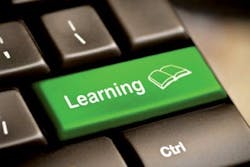About the author: Kate Cline is managing editor of WQP. Cline can be reached at [email protected].
Reading textbooks, studying, cramming for tests—for many, these words evoke not-so-fond memories of school days and midterm exams. They also likely sound familiar to water professionals who have qualified for certifications through the Water Quality Assn. (WQA): Until a few years ago, those seeking certification had to read a textbook, then take a test.
In 2014, WQA overhauled the education and certification process with the introduction of its Modular Education Program (MEP). This online-based learning program packages content into “bite-sized” courses, and incorporates hands-on activities. Each “learner” also is assigned a mentor—usually an experienced coworker who provides feedback and approves work. According to Tanya Lubner, professional certification and training director for WQA, the MEP now has more than 700 learners.
Fifteen of them are employees of Cleanwater Corp. of America, which has more than 70 employees at seven dealerships in Michigan and Colorado. According to Troy Macumber, CWS, CI, of Cleanwater Corp. of America, implementing the MEP started slowly, with just three employees. “I got some feelers from all of them to see what they thought of it,” he said.
Macumber’s initial concerns—that the lessons might be too time-consuming and that less computer-savvy employees might have trouble with the technology—were assuaged by their feedback. “All had positive things to say about it, so we decided to roll it out and expand it,” he said. “We have been adding a few people every few months.”
La Marzocco, an espresso machine manufacturing company, also started small with the MEP. To begin, the handful of staff members most likely to encounter questions about water quality and treatment—call center technicians and trainers—were enrolled in the program. “Our internal training program currently is more focused on … how to service, calibrate and program the espresso equipment—which is why the MEP has been so useful for us. It fills a need for us,” said Larry Eister, director, after-sales support, for La Marzocco USA. Six of approximately 40 employees at the company’s Seattle location currently are enrolled in the MEP.
Mentors & Incentives
For a well-established a dealership company like Cleanwater Corp. of America, which has been in business for four generations, the mentorship aspect of the MEP was a no-brainer. “Most of our management is very experienced, and most of them are already [Master Water Specialist] level, so we use them as mentors,” Macumber said.
Eister has found mentorship to be a bit more challenging. None of the La Marzocco staff is certified yet—the learners are still working toward their certifications—and as an espresso machine manufacturer, there is not much water treatment equipment around to provide hands-on examples. To help resolve this issue, Eister has found a solution: “We know organizations that are in the water treatment hardware business, and we are linking up with them to do some of the mentoring aspects of the program.”
To keep staff motivated to complete their education and achieve certification, Cleanwater Corp. of America has opted for an incentive program.
“Besides the individual’s satisfaction of being more knowledgeable in the business, we offer bonuses and raises depending on the different levels of certification achieved,” Macumber said. “We look at it as the employees making themselves more valuable, so we should reward them as they become more qualified and get further invested in the business.”
Eister also is developing an incentive program that he hopes will encourage staff to make time for learning despite their busy schedules.
Finding the Benefits
Overall, both Eister and Macumber have found the MEP and WQA certification to be beneficial to their employees and companies.
Macumber noted that the MEP format is suited to water treatment professionals and their workloads. “Most people [who] work in our industry are hands-on learners,” he said. “Expecting them to stare at a book isn’t nearly as effective.”
Macumber also has not found time management to be a problem. “In our industry, we all know workloads fluctuate,” he said. “If you have a slow day, it’s a good way to be productive and educate yourself. Besides, it is well worth the time you spend.”
Eister has found the MEP to be valuable in that it gives customers confidence in the advice his employees provide. “You need to go through the entire program and become certified so that there is a validity and a recognized expertise that you can provide to the customer,” he said.
Both Eister and Macumber plan to have additional employees work toward certification using the MEP. “In my opinion, it is important because our industry is constantly changing and evolving,” Macumber said. “Having WQA certification, you have third-party credibility that you have industry knowledge. That helps you, your business and your customers.”
Download: Here
